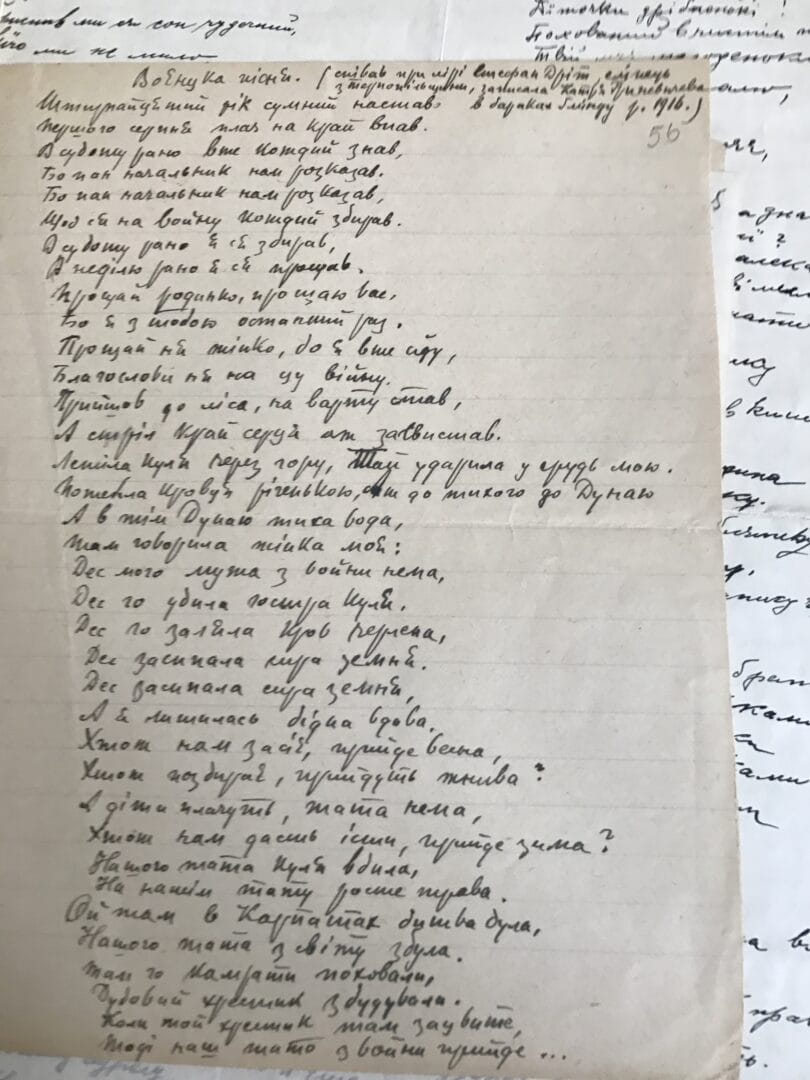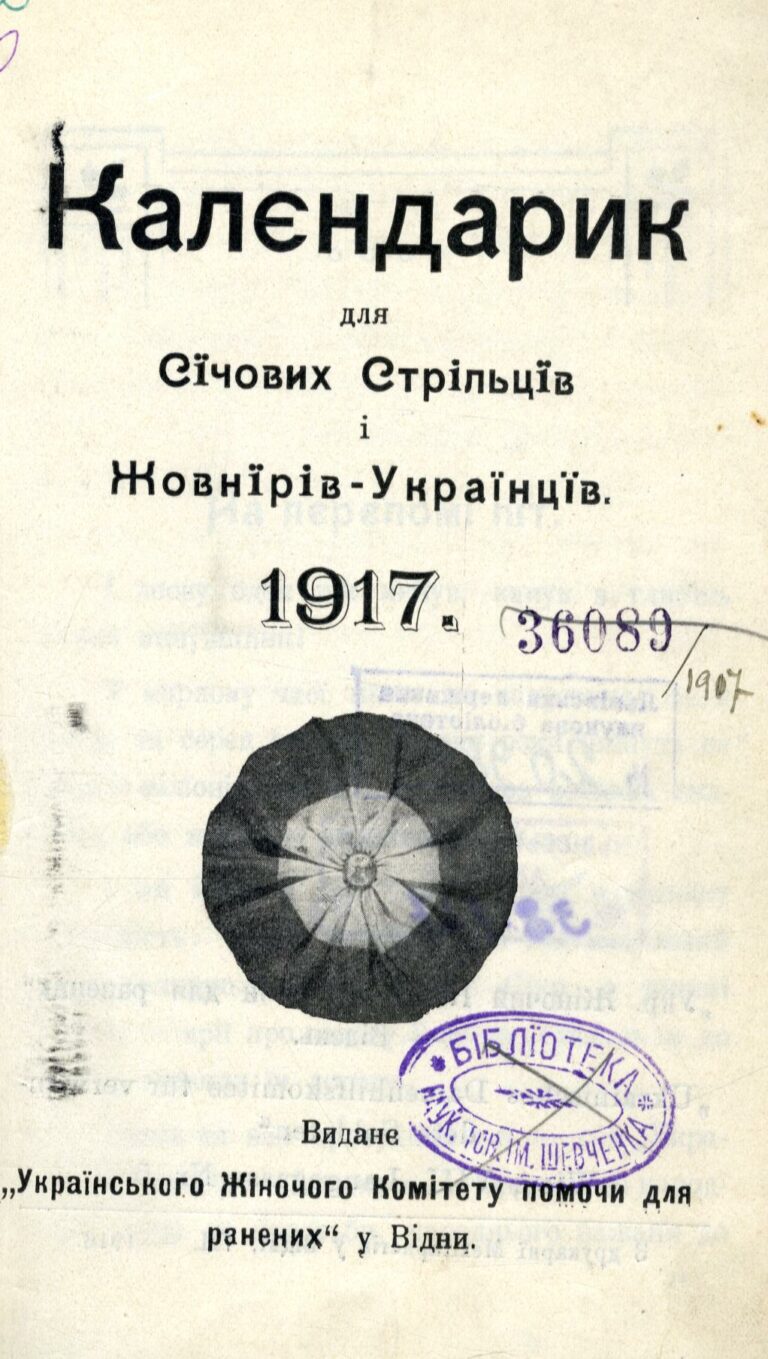War Song.
(performed with a lira by Stefan Drit, a blind singer from the Ternopil region, recorded by Katria Hrynevycheva in the barracks of Gmünd, 1916.)
The sorrowful 14th year has come,
On August 1st, lamentation befell the land.
On Saturday morning, everyone had the news,
Because the chief notified them.
Every man was called to the war.
On Saturday morning, I was packing up,
On Sunday, I was bidding my goodbyes.
Farewell, my dear family, forgive me for all,
For it’s the last time I see you.
Goodbye, my dear wife, it’s time for me to leave,
Bless me for this war.
I came to the forest, and stepped up on duty,
And the shelling whistled around.
The bullet was flying over the hill,
And struck me on my chest.
The blood ran in torrents,
And reached the calm Danube.
The Danube had the calm waters,
My wife was talking above them:
Where’s my husband not returning from the war?
He was killed by a sharp bullet.
He must have bled to death with his scarlet blood,
He must have been covered with dirt,
And I am left as his hapless widow.
Who’s going to sow our farmlands in the spring?
Who’s going to harvest the fields?
The children cry, for their father is gone,
Who’s going to feed us when the winter comes?
Our father was killed by a bullet,
Over our dad, the grass has grown.
A battle raged in the Carpathians,
And took away our dad’s life.
His brothers-in-arms buried him,
And put up an oak-wood cross on top.
When the cross comes into blossom,
Our father returns from the war…



This source is a folklore text representing the developments of the First World War. Katria Hrynevycheva (1875-1947), a writer, public activist, head of the Ukrainian Women’s Union (Soiuz Ukrainok), recorded a variation of the song in the city of Gmünd (Lower Austria), during her stay in the war refugees displacement camp. The recording was found in the archives of Volodymyr Hnatiuk. It is probably that Hrynevycheva was motivated by Hnatiuk’s call to document war-inspired pieces (see below the entry on “War and Folk Poetry”) and her personal story as a mother of two volunteer combatants from the Legion of Ukrainian Sich Riflemen (USR, Ukrainian National Military Formation within the Austro-Hungarian Army). The camp had over 30,000 civilians. At that time, they organized cultural and educational activities that encouraged the spread of different genres of amateur and folk creative efforts.
A song about the death of a soldier after a combat injury has two versions. The first version describes the struggle of the widowed wife and her children who were left without a family provider. The second version is about a mother saying her final goodbye to her son and a girlfriend paying her last respects to her beloved soldier. Both versions have two substantive sections: asking for a blessing before going to combat and a motif of a “bullet” flying over a hill and killing. The recording by Katria Hrynevycheva represents the first version. The second version was used by Sich riflemen transforming the intro in the song of Kuban Cossacks.
The song’s storyline represents three voices: of a man, of a woman, and of a child. One voice is in the monologue of a peasant conscripted in the first days of the war (“on August 1 the lamentation befell the land”). The second voice comes from his wife, who does not know the place of her husband’s death. She stayed alone (“poor widow”) to manage the household, which required some manpower. The third voice comes from lamenting orphaned children grieving that their fellows (“brothers-in-arms”) buried their father, and when the winter comes, they will starve. The image of a forest, a motif of a battle in the Carpathians – those are the elements from the song’s content generalizing the experience from the time of heavy defense battles of the Austro-Hungarian troops (with the USR as part of it) against the Russian army in the Carpathian mountains in autumn 1914.
The climax episode is the moment of fatal injury reinforced by a hyperbolized image of the “red”, “scarlet” (a dialect word “cherlenyi” is used for “dark red”) blood as a river flowing into the Danube. The symbolism of the Danube images as a road and a frontier between “this” and “that” other world, a folklore image of a “sharp bullet” (regardless of various modifications of the innovative weapons of those times) highlight the song’s epic context. Its tragic tone is represented by a folklore formula of the “impossible”: (if) an oakwood cross blossoms – (then) the father returns from the war.
The song is widespread mostly in western parts of Ukraine. It was especially popular still in the middle of the 20th century in the Carpathian region of residence of Ukrainian people (in Lemko region, Boyko region, Pokuttia region, Bukovina), and also in Podillia and Volhynia.